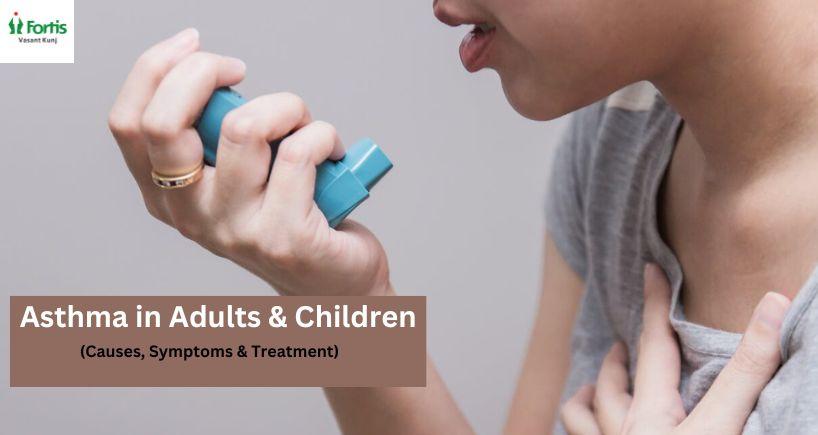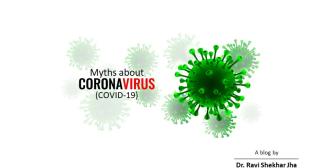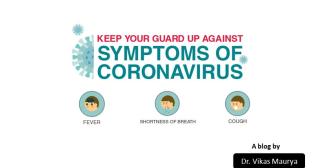
Asthma - Causes, Symptoms and Treatment in Adults and Children
Are you
- - Feeling breathless or wheezy?
- - Waking up coughing or wheezing?
- - Struggling to keep up with your normal activity/exercise due to breathing difficulty?
- - Feeling suffocated or develops chest tightness frequently
If you have any of these symptoms, you may be suffering from ASTHMA. Let’s try to understand symptoms, causes and treatment of Asthma.
What is Asthma?
Asthma is a long-term lung condition which causes difficulty in breathing and affects the breathing passages or airways of the lungs. When triggered, the inside layers of your airways swell even more. This reduces the space for air to move in and out of the lungs. The muscles that wrap around your airways also can tighten, making breathing even harder.
Asthma can be controlled easily in most of the cases, but one should remember that there is no permanent cure for Asthma. People with asthma have sensitive, inflamed airways that are more likely to react to triggers resulting in Asthma attacks. Asthma attack is caused by tightening of muscles around the airways which results in sudden worsening of asthma symptoms. During asthma flare-up, the muscles around the airways squeeze tight and along with airway swelling and mucus it becomes difficult to breathe.
Asthma symptoms usually include breathlessness, wheeze, cough or a tight chest. Symptoms may occur day or night and can vary over time.
Who gets Asthma?
According to WHO estimates, 339 million people suffer from asthma globally.
It affects people of all ages. According to NCBI, as adults, women have an increased asthma prevalence compared to men. Further, women are more likely to have severe asthma and a later onset of asthma compared to men. Boys have an increased prevalence of asthma compared to girls (11.9% vs. 7.5%, respectively), and boys are also twice as likely as girls to be hospitalized for an asthma exacerbation.
People with asthma may have a family history of asthma, or other allergic conditions like eczema and hay fever. Exposure to some chemicals or tobacco smoke can also lead to Asthma. Say No to Tobacco
What are Asthma triggers?
Certain things that can set off asthma symptoms – these are known as triggers. Please remember that when a person’s asthma is well-controlled by following an individualized asthma management plan, triggers are less likely to set off an asthma flare-up.
Some common asthma triggers include:
Smoking, stress, polluted places, Perfumes, Flowers, animal fur, certain food items (chocolates, ice-cream), Cold and flu, birds
Exercise and activity – Heavy exercises can trigger Asthma. Having good control of asthma symptoms allows people to live active &healthy lives. Speak to your doctor and plan to manage your asthma while carrying out your usual activities, including exercises to keep you fit and well.
Medications - Certain medications can trigger asthma in some people. Consult your Doctor and make him aware of the medications you are taking.
Diagnosis:
Asthma is easily diagnosed by careful history taking and evaluation by an expert. The doctor may perform simple blood tests and a pulmonary function test (spirometry) to confirm the diagnosis of asthma
Medications for Asthma
There are 2 kinds of asthma medications:
- Relievers: which provide immediate relief during asthma attacks
- Controllers: which act on a long-term basis on the airways to reduce swelling and spasm. It is important to remember that controller medications should be continued on a long-term basis. Medications can be given either as inhalers or nebulizers. Make sure you are using your medicines properly – ask your doctor for more advice.
Ask your doctor to
- - Show you how to use your asthma inhalers and devices
- - Check that you are able to do it correctly with regular reviews
As per NCBI, up to 94% of patients do not use their asthma medication devices correctly.
Using your asthma medication properly will help you breathe easy!
Regular review:
Plan to see expert AS PER THE FOLLOW UP PLAN laid by your Pulmonologist. If you are using your blue/grey reliever puffer more than two days per week, consult a doctor as soon as possible.
Categories
Clear allMeet the doctor

- Pulmonology | Pulmonology and Critical care | Sleep Medicine
-
22 Years
-
1600



















